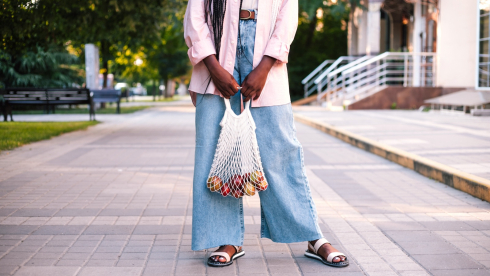Lisa and Evan are happily planning a life together. It’s the cutest thing ever. Lisa (30) and Evan (33) want to travel extensively, live abroad, engulf themselves in community art projects, and build a beautifully modern home that Evan—an architect—drew plans for himself. In that dream home, Lisa, whose passion is fashion design, will have her own studio space to draw and sew and flip through her favorite magazines.
Admittedly, when I feel weary about the state of Black love, I call Lisa and ask about their wedding and life plans. She was also the first person I called when I read about the cover of the newest edition of Time magazine. Much to the dismay of everyone around them, Lisa and Evan plan to remain childless after they marry.
“I only wanted dolls growing up so I could dress them prettily,” Lisa surrendered as we sat for cocktails and girl talk—half laughing, half wincing and hoping I wouldn’t judge her. Of course I didn’t judge. As a single mother and a feminist, I don’t at all believe that mother and woman are synonymous. I have a clear understanding of how one’s life changes after children. Therefore, I’m always encouraging women to be thoughtful before they take the plunge into parenthood.
I find it quite courageous that Lisa is creating the life she truly wants and not one that others expect of her. After all, we’re both G.R.I.T.S. (girls raised in the south) whose families considered us moving towards spinsterhood when we approached our mid-20s and were still single. We took separate paths, but we’re both very happy with our lives.
Lisa loves hearing me gloat about Nay’s love of reading and recitals, and I love to hear her brag about how well she’s doing in her Mandarin classes. She believes that she wouldn’t have room in her life to study Mandarin (or abruptly move to Beijing as she’s planning) if she had children, and she’s probably right. Spontaneity, free time and children rarely go hand in hand, and it’s perfectly okay to opt out.
Evan doesn’t want children either, and the decision not to have them wasn’t something he was coerced into. He loves children, mentoring them especially, but doesn’t want the responsibility of being a parent full-time, and he knows that up front. Plus, he’s told me that he grew up with two parents regularly putting him in the middle of their fights post- divorce, and he vowed as a teenager he never wanted to be in that position himself.
Many will say that Lisa and Evan are selfish or abnormal, especially in the African-American community where establishing and raising strong families is a constant bullet on our plan towards progress. But the question I always ask is: what kind of parents will folks become if they have children, not because they desire to, but because of pressures from their families, communities and larger society? I’d assume not very good ones in most cases.
My pregnancy was planned and wanted. I can’t imagine how I’d cope if I had my daughter out of some feeling of obligation, but I’m pretty certain neither of us would be leading the happy healthy lives we both deserve. Of course, I’m speaking from my own experience and mine alone. Psychology professor Sonja Lyubomirsky writes the following concerning the losses and gains that parents experience after having children:
“Children give our lives purpose, infuse fun and pride into our lives, and enrich our identities. At the same time, they are also vectors for worry, anger and disappointment; they deprive us of energy and sleep; and they strain our finances and our marriages. Not surprisingly, research suggests that the downsides of parenting are more evident when kids are very young or teenagers, and when we lack the resources (monetary, social, developmental) to manage them.”
Everybody isn’t down for the sacrifices that come with parenting, and living fulfilling lives sans children doesn’t make men or women shallow. Writer Carolina Miranda pushes back against the naysayers:
“In so much of what is reported, childless adults are often depicted as slavishly self-involved: people who sacrifice communal bonds in order to hole up with box wine and re-runs of The Walking Dead. In our case, it couldn’t be farther from the reality. In choosing not to have children, we have not abdicated obligations to friends and family. When my father developed brain cancer, I took him to treatment almost every day for eight weeks. When my mother-in-law had an aneurysm, my husband took off to help care her for her. In the coming years, I will watch nieces grow up and keep a close eye on friends who might feel depressed. I will spend a great deal of time with people I care for deeply.”
The truth is, childless individuals and/or couples are not freaks of nature as is often suggested by psychologists, politicians and the media overall. They are, instead, forging their own way in the world and living life on their terms. Such audacity should be applauded and not admonished—or maybe I’m just longing for the days where I can sleep in and use the restroom without someone bursting through the door, screaming for absolutely no reason.
What say you? How do you feel about adults who remain childless? If you’re an adult who has chosen not to have children, do you think you are demonized as self-indulgent and superficial?
Josie Pickens is an educator, cultural critic and scribe. Follow her musings on Twitter @jonubian.













